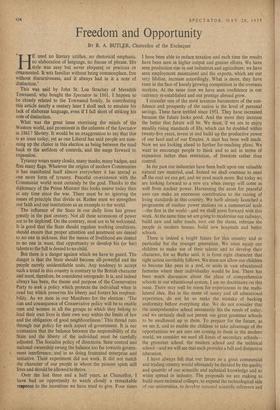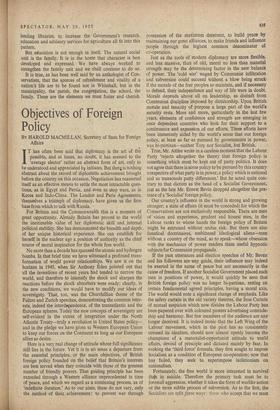Freedom and Opportunity
BY R. A. BUTLER, Chancellor of the Exchequer E used no literary artifice, no rhetorical emphasis, no elaboration of language, no finesse of phrase. His style was easy but never eloquent or precious or ornamented. It was familiar without being commonplace, free without discursiveness, and it always had in it a note of distinction.'
This was said by John St. Loe Strachey of Meredith Townsend, who bought the Spectator in 1861. I happen to be closely related to the Townsend family. In contributing this article nearly a century later I shall seek to emulate his lack of elaborate language, even if I fall short of striking his What was the great issue exercising the minds of the Western world, and prominent in the columns of the Spectator in 1861? Slavery. It would be an exaggeration to say that this is an issue today, yet as one Liberal has said people are sum- ming up the choice in this election as being between the road back to the serfdom of controls, and the surge forward to expansion.
Tyranny wears many cloaks, many masks, many badges, and flies many flags. Whatever the origins of modern Communism it has manifested itself almost everywhere it has spread as one more form of tyranny. Peaceful co-existence with the Communist world must certainly be the goal. Thanks to the diplomacy of the Prime Minister this looks nearer today than at any time since the war. There must be no ignoring the issues of+ principle that divide us. Rather must we strengthen our faith and our institutions as an example to the world.
The influence of the State in our daily lives has grown greatly in the past century. Not all these accessions of power are to be deplored. On the contrary, most are to be welcomed. It is good that the State should regulate working conditions, should ensure that proper attention and treatment are denied to no one in sickness, that the means of livelihood are denied to no one in want, that opportunity to develop his (or her) talents to the full is denied to no child. I have been able to reduce taxation and each time the results have been seen in higher output and greater efforts. We have seen production rise in our industries and agriculture: we have seen employment maintained and the exports, which are our very lifeline, increase accordingly. What is more, they have risen in the face of keenly growing competition in the overseas markets. At the same time we have seen confidence in our currency re-established and our prestige abroad grow.
I consider one of the most accurate barometers of the con- fidence and prosperity of the nation is the level of personal savings. These have trebled since 1951. They have increased because the future looks good. And the more they increase the better that future will be. We must, if we are to enjoy steadily rising standards of life, which can be doubled within twenty-five years, invest in and build up the productive power of our land and of our Empire. A start has been well made. Now we are looking ahead to further far-reaching plans. We want to encourage people to think and to act in terms of expansion rather than restriction, of freedom rather than control.
In the past our industries have been built upon our valuable natural raw material, coal. Indeed we shall continue to need all the coal we can get; and we need much more. But today we are looking forward to a new era when energy will come as well from nuclear power. Harnessing the atom for peaceful uses can make an enormous contribution to the raising of living standards in this country. We hale already launched a programme of nuclear power stations on a commercial scale —the first in the world—and we shall press forward with this work. At the same time we are going to modernise our railways, build new and safer roads, root out the slums, rehouse the people in modern homes, build new hospitals and better schools.
There is indeed a bright future for this country and in particular for the younger generation. We must equip our children to make use of their talents and to develop their character, for as Burke said, it is from right character that right action inevitably follows. We must not allow our children to become like peas in a pod, or units in vast educational factories where their individuality would be lost. There has been much discussion about the place of comprehensive schools in our educational system. I am no doctrinaire on this issue. There may well be room for experiments in the multi- lateral idea. But in the name of sanity and all educational experience, do not let us make the mistake of backing uniformity before everything else. We do not consider that lending libraries, to increase the Government's research, education and advisory services for agriculture all fit into this pattern.
But education is nor enough in itself. The natural social unit is the family. It is in the home that character is best developed and expressed. We have always worked to strengthen the family unit and we shall continue to do so.
It is true, as has been well said by an anthologist of Con- servatism, that the spumes of refreshment and vitality of a nation's life are to be found not in Whitehall, but in the municipality, the parish, the congregation, the school, the family. These are the elements we must foster and cherish.











































 Previous page
Previous page